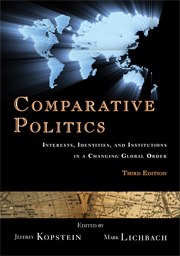Book contents
- Frontmatter
- Contents
- List of Maps
- Preface to the Third Edition
- List of Contributors
- 1 What Is Comparative Politics?
- 2 The Framework of Analysis
- PART ONE EARLY DEVELOPERS
- PART TWO MIDDLE DEVELOPERS
- PART THREE LATE DEVELOPERS
- 7 Russia
- 8 China
- STOP AND COMPARE
- PART FOUR EXPERIMENTAL DEVELOPERS
- Index
- References
7 - Russia
from PART THREE - LATE DEVELOPERS
- Frontmatter
- Contents
- List of Maps
- Preface to the Third Edition
- List of Contributors
- 1 What Is Comparative Politics?
- 2 The Framework of Analysis
- PART ONE EARLY DEVELOPERS
- PART TWO MIDDLE DEVELOPERS
- PART THREE LATE DEVELOPERS
- 7 Russia
- 8 China
- STOP AND COMPARE
- PART FOUR EXPERIMENTAL DEVELOPERS
- Index
- References
Summary
Introduction
Russia has long puzzled and surprised observers of international politics. For seven decades, Russia was at the center of a communist regime – the Union of Soviet Socialist Republics, or USSR – that competed with the United States for global supremacy (see Table 7.1 at the end of the chapter). After the collapse of the USSR in 1991, Russia suffered a prolonged period of political, military, and economic decay. During the two terms of President Vladimir Putin, the Russian economy rebounded strongly, but this growth was accompanied by a return to political authoritarianism. There is no consensus among specialists about how this one-time superpower became so weak so quickly; nor do scholars agree in their evaluations of Putin's efforts to revive the country. Indeed, it seems that Russia simply does not fit conventional analytic categories.
Geographically, Russia is the biggest country in the world, spanning 11 time zones. Most of its population is in Europe; most of its territory is in Asia. Although about four-fifths of its population are ethnically Russian, the Russian Federation contains hundreds of other ethnic groups, some of which have engaged in serious struggles for greater autonomy or – in the case of Chechnya – full independence. Should we call Russia a European, an Asian, or a “Eurasian” state? Is Russia a nation or an empire? Might Russia eventually break up into smaller regional units? Or is it emerging again as a revitalized great power in world politics?
- Type
- Chapter
- Information
- Comparative PoliticsInterests, Identities, and Institutions in a Changing Global Order, pp. 218 - 269Publisher: Cambridge University PressPrint publication year: 2008

